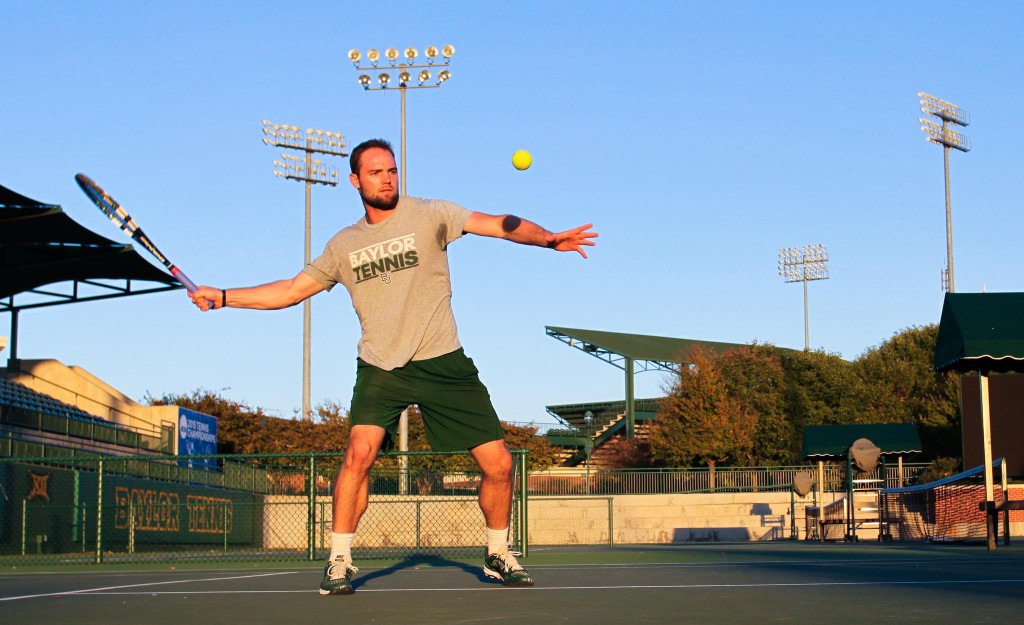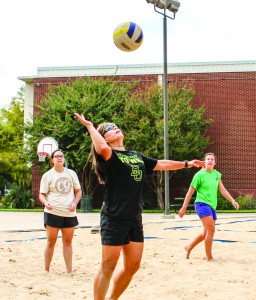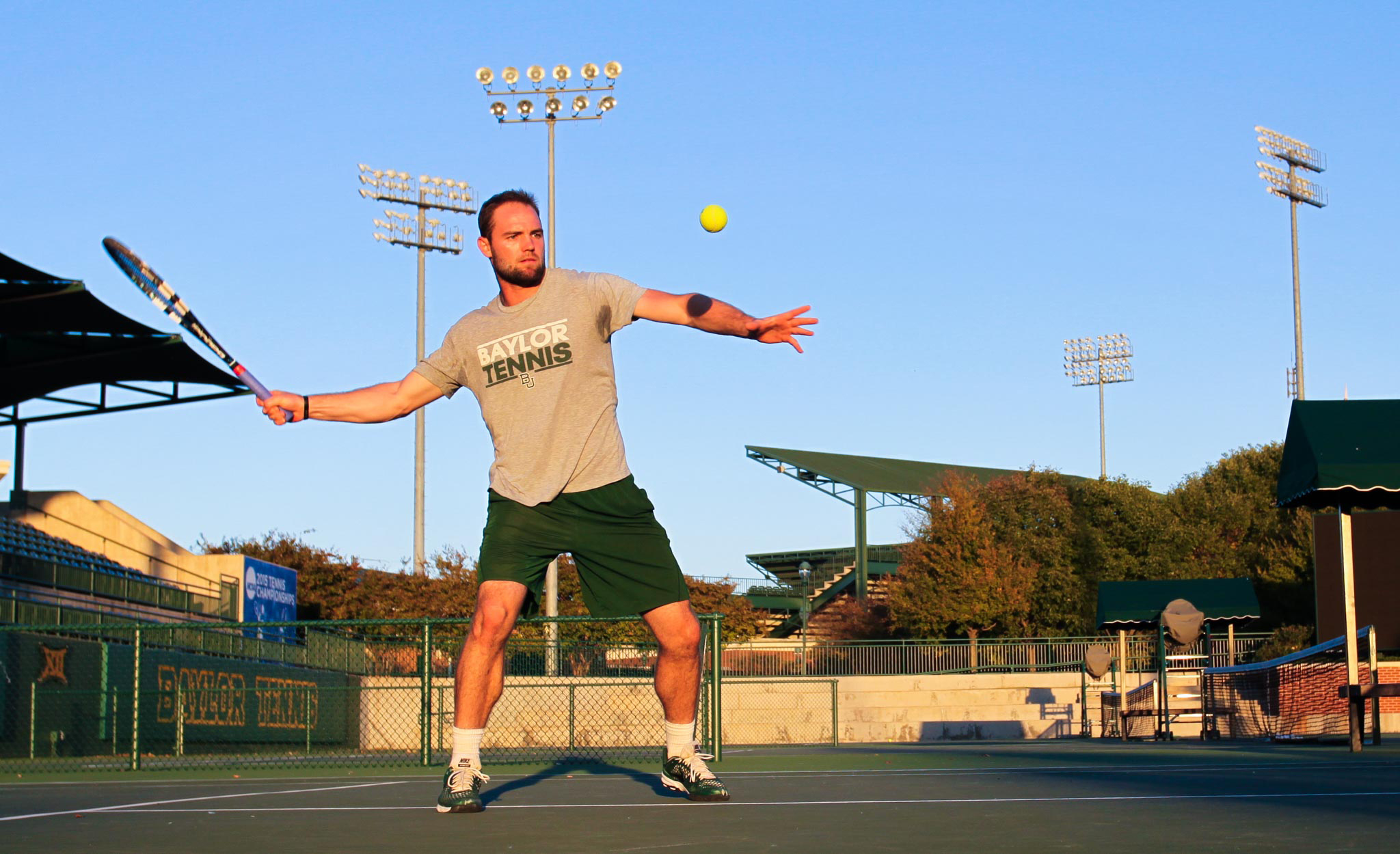Story by Cody Soto
Mate Zsiga is from Szeged, Hungary. Van Davis is from Thailand.
Zsiga is physically overpowering at 6-foot-2. Davis is a pint-sized 5-foot even.
Zsiga grips a tennis racket. Davis wears knee pads for the volleyball court.

Although each individual is different in stature and purpose, their love and involvement with sports has brought them to Waco, Texas. After years of adjusting to life in the U.S., their advice is
the same: do not be afraid.
“I thought I had a lot of burdens on my shoulders, and (moving to the U.S.) was not the best thing that I could have done,” Zsiga said. “But if you have a chance to take a risk and go for it, just do it. Don’t hesitate because if you do, then you’ll be too careful. Then, you already lost.”
Like Zsiga, Davis had to take her own advice when she moved to the United States for the first time.
Davis became a U.S. citizen when she was 15 years old, leaving behind her native home of Thailand and everything she knew, including soccer.
“When I first came to the states, some neighbors asked me if I wanted to play football,” Davis said. “They start throwing this ball, and I was waiting for the round soccer ball, but they didn’t know what soccer was. I grew up playing that and not much of anything else.”
She was shocked to learn that soccer was not as popular in America.
But going to high school in Tombstone, N.M., forced Davis to learn other sports, and she quickly became a multi-sport athlete playing volleyball, basketball and running track. To Davis, this learning process was different but exciting.
“I was forced to play other sports, and that’s when I got into volleyball, basketball and track,” Davis said. “Sports came pretty easy, especially volleyball.”
Davis was stuck between two decisions when she was 15: staying in Thailand and passing up an opportunity for higher education, or take the risk and live in the United States. At first, Davis couldn’t wait to go back to Thailand after high school graduation. However, three years of living in America changed her mentality.
“Imagine everything in your life up until that point, and think of the opposite. I didn’t know anything,” Davis said. “When I first moved, my goal in life was to finish high school, get a job at a fast food place, save up for a year and fly home.”
It wasn’t until a few years passed that she discovered her niche in her high school: sports. For the first time since moving from Thailand, she finally left her fear of living in the U.S. behind. She finally realized she felt like an American.
“Once I found sports, I felt like I was excelling. Everyone knew who (Van) was, so that gave me an “in” to friendships, teachers and just being accepted into a new place,” Davis said. “I realized I had an opportunity to go to college. I didn’t see that my freshman year. Sports connected me to everyone at that school and gave me a future.”
Forty years later, Davis has established herself as one of Central Texas’ most prominent volleyball figures. After a coaching stint at her alma mater, Western New Mexico University, Davis came to Waco in 1999 and helped establish the Waco Juniors Volleyball Club for every girl to have a chance to play club ball.
“This community did not have (club) volleyball, and we were the only club in Central Texas,” Davis said. “That was cool to see we created this volleyball community. Now, three other clubs spawned from it. I love challenges, and that was fun to coach, direct and be a part of.”

Zsiga came to the United States 41 years after Davis, but unlike her, he knew from the beginning the U.S. was where he needed to be. In 2011, he was recruited to play for Baylor’s men’s tennis team, a 21-time Big 12 championship program. Zsiga’s decision to play collegiate tennis in the U.S. was influenced by Baylor head coach Matt Knoll’s visit to Hungary.
“Two coaches came to Hungary just to talk to me: one from Michigan and Coach Knoll,” Zsiga said. “Coach Knoll is about fitness, and I knew it was going to be hard, but I wanted something like this, and it really worked out for me. After four years of being here, I definitely think I made the right decision.”
Born in Germany but of Hungarian heritage, Zsiga enjoys cross-culture environments, and the United States is a good example of it, he said. He speaks three different languages: English, German and Hungarian, and he likes to bring his multi-cultural persona to the tennis court.
“I always feel like there’s something German in me,” Zsiga said. “I was born there, I went to school there, and my whole mind and attitude is kind of like a German on the tennis court. The German tennis system is really good, and it helped me a lot.”
His multicultural influences didn’t end with him coming to America. Playing on a team with multiple tennis players from Europe, South America and the U.S., he was constantly learning with his teammates about their own backgrounds.
“We all put something different on the table, and it makes Baylor tennis special,” Zsiga said. “Diversity from that many countries is special. It doesn’t always make it the same thing.”
The United States allows Zsiga and Davis to interact with multiple cultures. Davis enjoys the fusion of the American lifestyle with her heritage. In fact, she enjoyed it so much that she didn’t return home as often as she originally planned to.
“Going back (the first time), it was almost a shock to me,” Davis said. “You get used to the culture here. You get used to driving everywhere. Over there, you walk everywhere or take the metro now. There’s no comparison to Thailand.”
American culture may have been hard for both Zsiga and Davis to adjust to at first, but they found themselves a part of something new, a part of a new culture.
“Sports is much more than wins and losses,” she said. “When I coach, it’s never about that, it’s about everything else, all the small things. Volleyball will stop, but life goes on, and the lessons will continue. It’s so important.”
Zsiga will graduate from Baylor in May with a corporate communications degree, and Davis is spending her 16th year as assistant director for fitness and nutrition at the McLane Student Life Center. Both credit their moves to the United States for the opportunities given to them.
“I wouldn’t be where I’m at without my (American) education,” Davis said. “We hear that America is the land of opportunity all the time, but it really is. You can do just about anything if you put your mind to it. Back home, you don’t have this kind of opportunity. It gets you to appreciate it.”
In the end, Zsiga and Davis’s experiences in the United States left an impact on their heart, something they didn’t except when packing up their bags to move to a foreign country in 1972 and 2011. The American sports culture made the difference.
“I won’t put (my racket) down ever; it’s always going to be with me, so I’m never going to hang that on the wall,” Zsiga said. “This is what I do, and this is why I’m halfway across the world. This brought me here, and this sport defined my life.”

